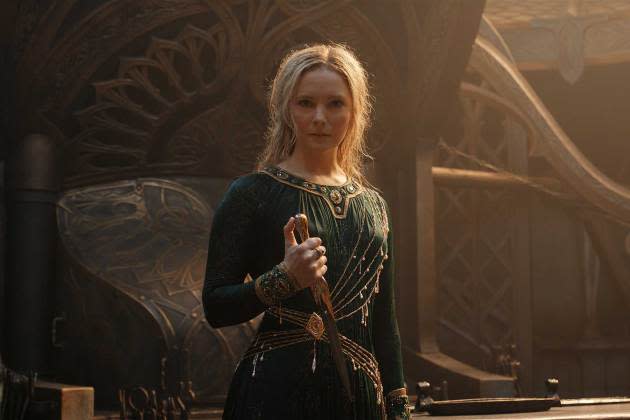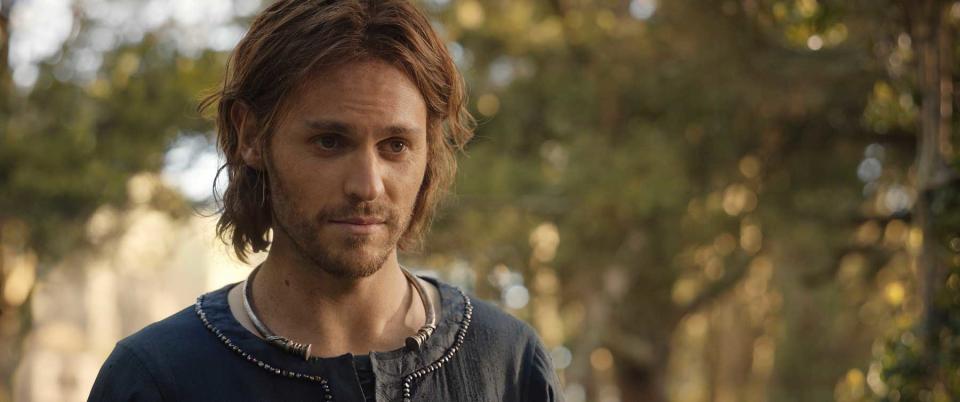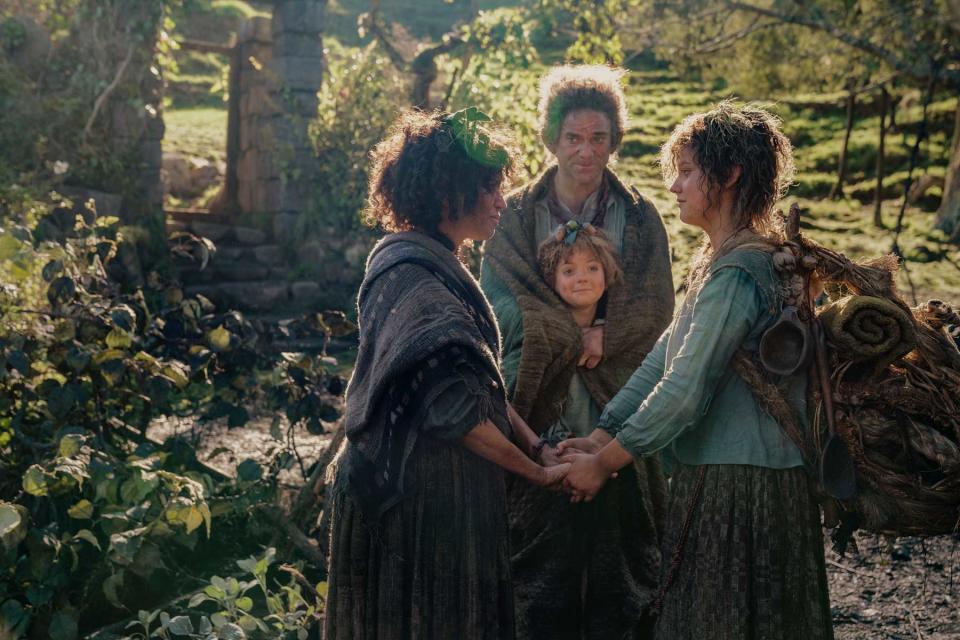‘The Lord of the Rings: The Rings of Power’ Finale: Did We Get Everything Amazon Paid For?

This post contains spoilers for the first season finale of The Lord of the Rings: The Rings of Power, which is now streaming on Amazon Prime Video.
Early in “Alloyed,” the concluding chapter to Season One of The Lord of the Rings: The Rings of Power, engineer Celebrimbor (Charles Edwards) studies a tiny sample of mithril, the magical mineral that could potentially save the whole elven race, if only he had enough of it. “If only,” he wonders, “there was some way of doing more with less.”
More from Rolling Stone
“More with less” is certainly not the operating principle of Rings of Power. It is reportedly the most expensive television show ever made, filled with epic battles and sweeping vistas of the fantasy world created by J.R.R. Tolkien. The sheer scale of the thing is meant as the biggest selling point. But with the eight-episode season concluded, it seems fair to wonder if perhaps the series has instead been doing a bit less with more than it should.
As was the case throughout the season, “Alloyed” had memorable, powerful moments. The subplot where young Nori (Markella Kavenagh) and her fellow Harfoots attempted to save the Stranger (Daniel Weyman) from the trio of witches felt particularly effective. The Harfoot story is the part of the show that most openly wears its heart on its sleeve, and it’s that sincerity that has made these Tolkien screen adaptations (both Peter Jackson’s original film trilogy and now this show, developed by Patrick McKay and J.D. Payne) so powerful. The spectacle helps, but it’s the emotionality that really makes this all work. Here, we not only got Nori reminding the Stranger of her belief that he’s fundamentally good, which gave him the courage to defeat the witches, but also the poignant death of Harfoot leader Sadoc (Lenny Henry), who accepted his fate and simply asked Nori and his other traveling companions to sit and watch the sunrise with him one more time(*).
(*) You might wonder why no one thought to ask the Stranger to use his magic to heal Sadoc, but Lenny Henry played the moment as a man who felt he had wandered enough in his life and was looking forward to his final rest.
But the sincerity of the Harfoots, or of dwarf Prince Durin (Owaine Arthur) and his wife Princess Disa (Sophia Nomvete) — both of whom were very much missed in the finale — feels strongly at odds with the way McKay and Payne built the season around the question of which character would turn out to be Sauron, the biggest bad in all of Middle Earth. Mystery box plotting in general has grown overused and tiresome in the post-Lost TV world, but it still fits some shows. On this one, though, the “Who is Sauron?” riddle clashed with the plainspoken tone of everything else. And it was also a half-hearted mystery at best, with a good chunk of the season using Orc leader Adar (Joseph Mawle) as a Sauron red herring, then losing interest in the idea until the finale began with the witches declaring the Stranger to be Sauron. This in turn made it clear that it couldn’t be him, because it was much too early in the episode, and suddenly the gamesmanship was undercutting any ability to engage with the story.

Sauron ultimately turned out to be Halbrand (Charlie Vickers), the rogue who rescued elf warrior Galadriel (Morfydd Clark) from drowning in the second episode. Initially, Halbrand came across as a Han Solo type, out for himself and uninterested in the noble quests of people like Galadriel. By mid-season, he had shifted into a mode more like Aragorn, the reluctant king from the original trilogy, as he appeared to be the king of the Middle Earth’s Southlands. And finally, Galadriel — who had just gone to great effort to save Halbrand from grievous wounds suffered in battle — realizes that her would-be friend is in fact the monster she has spent centuries chasing.
Sauron’s ability to get one over on his most obsessed opponent is an easy way to demonstrate his cleverness, which combined with his magical powers makes him incredibly dangerous to all of the show’s heroic characters. But it has the side effect of making Galadriel look like a dummy, after the early episodes had worked so hard to build her up as both tough and brilliant.
Galadriel’s arc wasn’t helped by the detour she and Halbrand took to the island kingdom of Numenor midway through the season. The Numenor scenes were both tedious and oddly cheap-looking. The show’s ability to properly light action and/or night sequences proved to be both blessing and curse: There was never a House of the Dragon moment where it became impossible to see what was happening, but everything in Numenor, and in most of the indoor scenes, were so overlit that it felt as if this billion-dollar production had been temporarily transformed into a Nineties syndicated fantasy drama shot in Vancouver.
The show also seemed to waver back and forth between wanting to excite the hardcore Tolkien fans and making the show work for relative newcomers (or, at least, for people who had seen the Jackson movies once). One of the Numenor characters, for instance, is Isildur (Maxim Baldry), the callow teenage son of revered ship captain Elendil (Lloyd Owen). If you know all about the hugely important and dramatic future ahead of Isildur, the scenes of him struggling to find direction in his life perhaps play as a compelling starting point for a hero’s journey; if you don’t know it, or only vaguely remember him being mentioned at the start of The Fellowship of the Ring, then you’re stuck in a Riverdale episode with wigs and swords(*). Conversely, when Adar’s scheme to set off a volcanic eruption to blacken the Southlands was executed at the end of the sixth episode, many Toliken-ites immediately recognized this as the creation of Mount Doom as the centerpiece of Sauron’s kingdom of Mordor. But at the end of the seventh episode, the show was careful to transform the “Southlands” location chyron into one that read “Mordor,” just in case the casuals hadn’t gotten it yet.
(*) In this context, maybe we would call it Rieavearyaedaele? With lots of overpronounced r’s?
This is hard property to wrestle down under any circumstances, and especially one where the cost of making it is so high. As the defining show of Amazon’s attempt to become the one streamer to rule them all, Rings of Power has to attempt to be all things to all people — or, at least, to all potential fantasy fans. It’s an unfair task to ask of anyone. That McKay and Payne succeeded as often as they did throughout the season — in the introduction of Galadriel, in the poignant friendship between Durin and the wise Elrond (Robert Aramayo), in the humans versus orcs battle sequence that led to Mount Doom’s eruption — is in many ways remarkable. But at other times, Rings of Power played — like so many streaming debut seasons unfortunately do — as a very long pilot episode for the show all involved actually want to make, or at least like a rough draft of that show. (As soon as the finale abandoned the pretense that the Stranger was Sauron, it got right back to teasing the idea that he is an amnesiac Gandalf, with his friendship with Nori explaining why the much older Gandalf was so fond of hobbits.)

There’s enough good here to justify making like a Harfoot and continuing down this familiar path. But Rings of Power isn’t some scrappy underdog where it’s easy to forgive the growing pains along the way. No one involved is being asked to do more with less. We just have to hope they can do even more with more whenever this behemoth of a franchise returns.
Best of Rolling Stone

